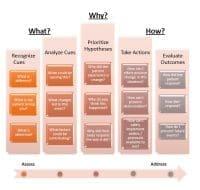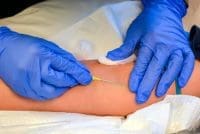COVID-19 has changed the landscape of the healthcare industry. In fact, it has warped an already intense environment and made for one that breeds higher levels of stress and anxiety than ever before. Do you know what is needed to not only survive, but to thrive, as a nurse during this time of crisis?
In 2006, the Robert Wood Johnson Project brought increased awareness of nurse attitudes and turnover rates with The RN Work Project. Data indicated that around 18% of new nurses leave their first nursing job within 1 year, and 26.2% leave within 2 years. Recent (2019) data from NSI Nursing Solutions indicates an increasing trend, with approximately 23% of new RNs leaving their jobs in the first year and one-third leaving within 2 years. Overall, bedside RN turnover ranges from 4.5% to 43.9%, and national RN vacancy rates are of concern at about 9%. Sadly, many nurses also report feeling burnt out and being disengaged.
Though we have yet to see the full impact of COVID-19 on nurses in the United States, a recent study published in JAMA Network Open indicates that healthcare professionals in China involved in direct care of COVID-19 patients experienced symptoms of depression and increased anxiety, insomnia, and distress. What are we waiting for? The time is now to address what nurses need to remain on the frontlines and maintain their passion for the nursing profession.
Grit and resilience
Angela Duckworth defines grit as passion and perseverance to achieve long-term goals. Individuals who are “gritty” are engaged in their work and able to persevere in spite of negative or difficult life events. They are motivated and flexible in using a variety of strategies to reach goals, which cushions them against the impact of hardships. Resilience is defined as the ability to bounce back after adversity or failure. Grit and resilience increase well-being and decrease burnout.
Globally, the nursing profession is celebrating “The Year of the Nurse and the Midwife”. Nurses make up the majority of the worldwide healthcare workforce and are now recognized as “essential workers” and “heroes”. Despite positive public opinion and the rewarding nature of the profession, we are experiencing a nursing shortage. The Bureau of Labor Statistics predicts that the United States will need an additional 200,000 nurses per year from now until 2026; this is just projected for one country. Your gifts and talents are needed and appreciated. The statistics sound daunting, but consider these characteristics of grit and resilience as you grow in the profession of nursing.
How to thrive
Do you know what it takes to thrive in the new healthcare landscape? Literature provides insight regarding the need for grit and resilience in nursing. Consider these strategies in your nursing practice:
Realize that mindset does matter. Though nurses are educated using a generalist approach, our clinical practice usually focuses on a single specialty area. After becoming accustomed to one specialty, it can be intimidating to work in a new and unfamiliar setting or with a different patient population—reverting back to the novice nurse. If we approach recent changes in healthcare with a growth mindset, realizing we are capable of learning new things, we are more likely to have a positive experience.
Let learning renew your passion. Florence Nightingale defined the art and science of the nursing profession; this includes a life-long commitment to learning. Nurses working in a time of crisis can build on their existing skills and learn new ones to deepen their passion for the profession. Get your game on, renew your passion, and find your inner “Flo”.
Remember your purpose. Perhaps you started your nursing career with the “dream job” mindset; now you are questioning your purpose. According to the American Nurses Association, nursing is the protection, promotion, and optimization of health and abilities, prevention of illness and injury, alleviation of suffering, and advocacy in the delivery of care. This is YOU—remind yourself of your purpose.
Maintain “wholeness of character”. As nurses, we know the importance of providing holistic care for our patients, but we frequently neglect self-care. The ANA Code of Ethics tells us that we owe the same duties to ourselves as to others, including maintaining “wholeness of character”. One essential aspect of self-care is spiritual self-care, which can involve a variety of activities such as attending religious services, prayer, and reflective journaling. Spiritual care promotes spiritual well-being, which is associated with resilience among nurses, supporting a decrease in emotional exhaustion that is often associated with working in a high-stress environment.
Cultivate a strong support system. The support of family, friends, and co-workers is integral to building grit and resilience. Staying connected and avoiding feelings of isolation are pivotal. Recent literature suggests that COVID-19 has greatly impacted the mental health of the nursing workforce, and steps need to be taken to ensure mental well-being in this time of uncertainty and chaos. Surround yourself with support, keep up the social distancing norm, and find ways to take care of YOU.
The time is now
Evidence supports the association of grit and resilience with feelings of well-being, career satisfaction, decreased emotional distress, and decreased attrition rates. The time is now to consider these characteristics in your professional mindset and ensure you have the grit and resilience to thrive in your nursing career.
Heather M. Humphreys is associate professor and Dana S. Woody is associate professor at the Liberty University School of Nursing in Lynchburg, Virginia.
References
American Nurses Association. Code of ethics with interpretive statements. https://www.nursingworld.org/practice-policy/nursing-excellence/ethics/code-of-ethics-for-nurses/
American Nurses Association. What is nursing? n.d. nursingworld.org/practice-policy/workforce/what-is-nursing/
Duckworth A. Grit: The Power of Passion and Perseverance. Scriber; 2016.
Duckworth A. 2020. Angela Duckworth Q&A: What is grit? angeladuckworth.com/qa/#faq-125
Dweck C. Mindset: The New Psychology of Success: How We Can Learn to Fulfill our Potential. The Random House Publishing Group; 2006.
Lai J, Ma S, Wang Y, et al. Factors associated with mental health outcomes among health care workers exposed to coronavirus disease. JAMA Netw Open. 2020;3(3):e203976.
Mealer M, Jones J, Meek P. Factors affecting resilience and development of posttraumatic stress disorder in critical care nurses. Am J Crit Care. 2017;26(3):184-92.
NSI Nursing Solutions, Inc. 2019 NSI National health care retention & RN staffing report. 2019. nsinursingsolutions.com/Documents/Library/NSI_National_Health_Care_Retention_Report.pdf
O’Keefe PA, Dweck CS, Walton, GM. Implicit theories of interest: Finding your passion or developing it? Psychol Sci. 2018;29(10):1653-64.
Pines EW, Rauschhuber ML, Norgan GH, et al. Stress resiliency, psychological empowerment and conflict management styles among baccalaureate nursing students. J Adv Nurs. 2012;68(7):1482-93.
PRC. National nursing engagement report. 2019. prccustomresearch.com/wp-content/uploads/2019/PRC_Nursing_Engagement_Report/PRC-NurseReport-Final-031819-Secure.pdf
Rushton C, Batcheller J, Schroeder K, Donohue P. Burnout and resilience among nurses practicing in high-intensity settings. Am J Crit Care. 2015;24(5):412-20.
Salles A, Cohen G, Mueller C. The relationship between grit and resident well-being. Am J Surg. 2014;207(2):251-54.
Suzuki Y, Tamesue D, Asahi K, Ishikawa Y. Grit and work engagement: A cross-sectional study. PLoS ONE. 2015;10(9):e0137501.
World Health Organization. The international year of the nurse and the midwife. 2020. https://www.who.int/news-room/campaigns/year-of-the-nurse-and-the-midwife-2020



















1 Comment. Leave new
Great paper but I disagree with the comments made under the heading of “Realize the mindset does matter.” It’s my belief that when a nurse goes from a familiar practice area to one that’s new, he or she becomes an advanced beginner. To say that he or she becomes a novice would suggest that the nurse brings nothing of value to the new setting. Quite the contrary, the nurse’s previous experiences are not wiped clean.